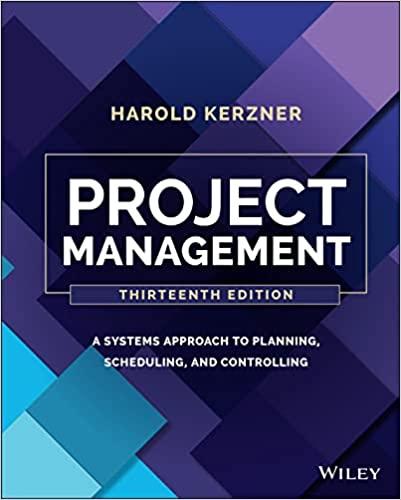Question
Each question is to be answered supported in a paragraph format from the textbook, Organizational Ethics: A Practical Approach by Craig Johnson. Book Link: https://scholar.google.com/scholar?hl=en&as_sdt=0%2C43&q=organizational+ethics+a+practical+approach&btnG=&oq=a+
Each question is to be answered supported in a paragraph format from the textbook, "Organizational Ethics: A Practical Approach by Craig Johnson. Book Link: https://scholar.google.com/scholar?hl=en&as_sdt=0%2C43&q=organizational+ethics+a+practical+approach&btnG=&oq=a+
Chapter One: Ethical Competencies and Perspectives 1. Apply all six ethical perspectives presented in the chapter to one of the chapter's case studies. Keep a record of your deliberations and conclusions using each one. Did you reach different solutions based on the theory you used? Were some of the perspectives more useful in this situation? Are you more confident after looking at the problem from a variety of perspectives?
Chapter Two: Personal Ethical Development 2. Analyze a popular television drama or movie from an ethical perspective. Identify the issues raised by the program/movie, the values it promotes, and the virtues and vices demonstrated by the important characters.
Chapter Three: Ethical Decision-Making 3. Select a moral issue, and evaluate its level of moral intensity using the components described in the chapter. Or choose an ethical dilemma that you think deserves more attention. What steps could you and other take to increase this issue's level of moral intensity?
Chapter Four: Ethical Interpersonal Communication 4. Based on the HURIER listening model, what are your strengths and weaknesses as a listener? What skills do you need to develop to become more effective? What does your listening style profile (Self-assessment 4.2) suggest about your listening habits and how they might hurt or help your relationships with other organizational members?
Chapter Five: Exercising Ethical Influence 5. Agree or disagree with each of these statements (in a few sentences for each): a. Empowerment takes advantage of workers. b. Impression management is unethical. c. Nothing good can come from playing organizational politics. d. The costs of emotional labor are overstated.
Chapter Six: Ethical Conflict Management 6. Reflect on the results of Self-assessment 6.1 (p. 161 - 162). Record your responses and answer the following questions: What is your conflict style? Why do you think you take this approach to conflict? How has this style been effective? Ineffective? What are the ethical strengths and weaknesses of this approach? What steps can you take to develop a more collaborative conflict style?
Step by Step Solution
There are 3 Steps involved in it
Step: 1

Get Instant Access to Expert-Tailored Solutions
See step-by-step solutions with expert insights and AI powered tools for academic success
Step: 2

Step: 3

Ace Your Homework with AI
Get the answers you need in no time with our AI-driven, step-by-step assistance
Get Started


